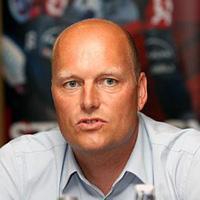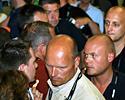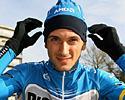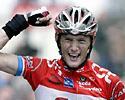
Recently on Cyclingnews.com |
An interview with Bjarne Riis, December 19, 2006
Time for change in the sport
CSC's new anti-doping policy is an effort to move on from the scandals of 2006 and prove that it is possible to win clean. Shane Stokes spoke to team owner Bjarne Riis about those plans, Ivan Basso, the future of the team and his view of the best way forward for cycling.

|
2006 was undoubtedly a mixed year for Team CSC. Given the results that the Danish squad achieved, it should have been a very fulfilling season, yet directeur sportif and owner Bjarne Riis will look back with a blend of satisfaction and regret.
On the plus side, the red, black and white outfit successfully defended their ProTour teams title, took individual or team stage wins in each of the Grand Tours, won the world championship time trial and Paris-Roubaix, triumphed in over 50 events, placed fourth in the Tour and Vuelta and last, but definitely not least, dominated the Giro d'Italia in June.
"Let's focus on what really has to be done. That is what I want. "- CSC boss Bjarne Riis says the debate on DNA testing is a red herring, as the rule cannot be made mandatory by the teams. Out of competition testing is the key, he says. |
However this latter victory is one which Riis will remember with very mixed feelings. Ivan Basso started the year as the big star of the team, with his second and third places in the 2005 and 2004 Tour de France showing that he was a genuine contender for the top step of the podium in three-week stage races. He delivered on that promise with three individual stage wins plus the overall title in the Giro, yet his implication in the Operación Puerto affair meant that he was pulled from the Tour de France team at the last moment, becoming arguably the biggest of some very big names not to start.
Basso insisted upon his innocence but due to his refusal to take a DNA test which would have removed most of the suspicions about him, his future with the team remained uncertain. Even after the Italian federation announced that it was shelving the charges against him, Riis was unsure if he could hold onto his big star. After all, the possibility that Operación Puerto proceedings could restart once the judicial trial concluded - something stated by the UCI, who remain convinced that the evidence is considerable against at least some of the implicated riders - meant that the team could find themselves in the media spotlight once again next summer. The 42 year old Dane had a real dilemma on his hands.
In the end, he and Basso decided to go their separate ways. Their relationship had been put under real strain by the Operación Puerto affair and it was finally agreed that a split was best. Riis duly promoted Carlos Sastre to leader of the team for the Grand Tours, encouraged by his fourth in the Vuelta and the Tour [he may end up third in the latter if Floyd Landis is ultimately disqualified], while Basso signed for arch-rivals Discovery Channel. It was, to be frank, a disappointing ending to what had been a very close directeur sportif - rider partnership.
Rather than losing heart, though, Riis is determined to press on, and in a rather revolutionary way too. Earlier this year it was announced that Danish anti-doping expert Rasmus Damsgaard would work with the team in 2007, conducting a large number of out of competition tests on the riders.
It was hoped that this would have the dual goal of preventing anyone on the team from dabbling into cycling's equivalent of Pandora's box and also, from a public relations point of view, removing any questions about the squad and its successes. Having raced himself in the pre-Festina Affair era, Riis is aware that big successes are sometimes viewed with suspicion and innuendo. His belief is that after the scandals of 2006, the survival of cycling depends on some radical measures. It is no longer enough to win; now, it's important to show that those victories have been achieved in a clean way.
"The idea came after the Tour," he told Cyclingnews recently. "All of us were thinking a lot about the future and what can be done in cycling. We came up with the idea that we should make contact with Ramus Damsgaard and that he would devise an anti-doping programme that was sufficient. He was very positive about it. Personally, I believe that it is actually the best anti-doping programme in history. I look forward to starting it, at least for my team, and hope that many other teams will follow.
"Okay, T-Mobile have already introduced something which while it is not quite the same, it is similar. I think that in a positive way, everything can be done in this direction is good for the sport."
Riis plays down any suggestions that the Computer Sciences Corporation backers were considering pulling out after the problem at the Tour. "This has nothing to do with our sponsors," he stated. "Of course, they are all happy with what we are going to do, but bringing this in has nothing to do with that [the speculation that they might stop funding the team]. It is my own initiative."
According to the Dane, the projected cost of the estimated 800 random tests is "over 300,000 Euros" and will be paid for out of the team's budget rather than any extra contribution from the sponsors. The majority will be conducted out-of-competition.
"Practically all of them are," he states. "Otherwise it makes no sense. This is of course what has to be discussed for the future, because it is what we need to do in order to get rid of doping. You need more out of competition tests, and less discussion about anything else. That's what we need to do... not a discussion about DNA or whatever, but a discussion about what can be. The decision that has to be made is for out of competition tests."
Operación Puerto uncovered almost 100 bags of stored blood or blood products and as DNA sampling is the only way to conclusively prove (or disprove) the identity of the donors, many within the sport have argued that such testing should be made compulsory. This opinion is far from unanimous, though, with several big names such as world champion Paolo Bettini and ProTour victor Alejandro Valverde stating that they are strongly opposed to such measures. Yet other riders have said that they will provide samples in order to show that they have nothing to hide.
Riis is of the first group and states that it is his belief that current debate is a red herring. His view is that there are much better ways of encouraging a clean sport, and that attention needs to be focussed on these areas.
"We won't bring in that testing. The reason is that in doing a programme like this, DNA is totally out of the question. In fact, I think that the whole discussion about that type of test actually moves the focus from what we really have to work on, and that is out of competition testing. So let's not divert the focus from what is important for cycling and sport in general.
"Instead, let's focus on what really has to be done. That is what I want. Besides, in the end, we can ask people to give DNA samples but legally we are not in a position where we can force them to do so. What we should spend energy on doing is telling people how to behave, how to not have any dealings with doping.
"Ok, this is an anti-doping programme but a lot of it is also about talking to riders and thinking about their health. These are the things that we are planning and what we wanted to discuss with them. We want to show that we give a top performance, amongst the best, and to prove that we are clean."
How it will work

|
Dr Rasmus Damsgaard will oversee the tests, which will be run in addition to the normal battery of UCI/WADA sanctioned out of competition plus regular in-competition programmes. Apart from monitoring for an unusual (or positive) once-off reading, those samples taken on the team's behalf will also enable a longitudinal record to be gathered. This profile will help define the normal parameters for each rider, with any sudden change likely to result in further investigation.
The UCI and WADA will reportedly be provided the results upon request and, at the end of the 2007 season, a summary of the results will be communicated to the press.
"Everything is of course internal," said Riis. "But of course all the tests will be made in official laboratories, different places where Rasmus Damsgaard has the contacts. You have to understand that he is not part of the team, he is an outside person that we have got involved to do all this."
He says that if unacceptable findings are seen, there will be a clear course of action. "We will have internal sanctions, and of course we will do something about it if we have some suspicious, very suspicious or positive tests. Between him [Rasmus Damsgaard] and us, we have very specific rules about the course of action. But I don't want to comment on it in precise detail now because it is an internal thing, of course.
"At the end of the year we will send out some details. We are going to communicate on how many tests we did, which tests and provide the different values. Of course, we will not be naming specific riders because we are not allowed to do that, but we will give the overall picture. We will try to be as informative as possible without ruining any personal rights and stuff like that."
What of Ivan?

|
When asked about the Basso situation, Riis gives his opinion about chain of events. He maintains that there was nothing to suggest that anything was wrong - "his test values were all normal," he states. "There was no indication that anything was amiss."
That said, he realises that once the rider was implicated in Operación Puerto, the situation was a very difficult one to resolve. The Italian federation may have shelved their investigation but the UCI has said that the case against the riders could yet be reopened once the judicial proceedings are finished. Riis said that this was a factor he had to consider when deciding with Basso if he would stay or leave.
"The problem is that we have no guarantee that this case is over," he explains. "This was of course a big issue for us [in deciding whether or not Basso could stay with the team - ed.]." In the end, the Italian did leave, going to the Discovery Channel team.
Somewhat diplomatically, Riis declines to comment on that signing. "I set him free, I had an agreement with him and he was free to choose whatever he wanted to do," he states. "So I cannot have any reactions to that. I cannot have anything against that [the signing by another ProTour team], otherwise I should have kept him. This I will leave up to everybody else, but I am not going to give any reactions to that because it is not my team."
At the time, Discovery came under criticism from some within the sport because they felt taking Basso on went against the spirit of the agreement that no ProTour teams would sign riders still under investigation in Operación Puerto. Their response was that his case had been shelved by the Italian federation and that they felt he had no case to answer. Even so, the fact that the file could be reopened at a future point made quite a few people - including other ProTour team managers - uneasy about the contract.
This lessened somewhat when Basso and his lawyer said that they would agree to provide a DNA sample if it was requested in a national judicial or disciplinary investigation. It seemed an about-turn on earlier insistences that no such sample would be provided. For his part, Riis said that while he couldn't force Basso to do such a test, that volunteering to do so would have taken away a lot of the suspicion and enabled him to remain with the team.
"It is nice that he says he will do a DNA test now," he said, when asked about this. "But I wonder why he couldn't do that with us... We were of course talking about it. We didn't say that he had to do it, as we can't insist on something like that, but of course we asked him about the possibility of it. We left open all the possibilities to prove that he is clean.
"If he had done a DNA test, sure... he would have been able to stay. That would have solved a lot of problems, of course."
More recently, the Discovery Channel team was excluded from IPCT (International Professional Cycling Teams), a group made up of most of the ProTour squads. Their judgement was that Discovery had broken the spirit of the Code of Conduct by signing the Italian.
Tougher controls than other teams, but a very successful season still expected

|
The main impetus for the new tests is, of course, what happened at the Tour de France. Whether or not Basso did have any contact with Dr. Fuentes, the team encountered a lot of negative publicity and this is something that Riis is trying to ensure does not happen again. The number of scandals and positive dope stories since the 1998 Festina Affair have led to a degree of scepticism in the media and the public; his hope is that these new tests will help dismiss any speculation that CSC riders are behaving improperly.
Even though they will be undergoing more stringent controls than most of the other riders in the ProTour (thus far, only T-Mobile has announced a comparable anti-doping programme), Riis remains convinced that CSC can continue to be successful.
"I have no doubt about that," he says, confidently. "If I had a doubt about that [the riders being clean], I would never have come up with a programme like this. I hope it is sending out a good message. Everything that can be done for the sport is important, right now, and everybody who can do something about it should do so... it is their duty to do something. The only way forward is to clean up the sport. I think what we are doing will be a good solution.
"We have a very strong team, I think we have shown that this year and we have been able to perform during the whole year. That is what we want to do again. To be there from the start until the very end, we are going to be in the Classics, we are going to be in the big Tours... different levels, of course. I think we will be competitive in the big Tours, it depends little bit on what we choose with Carlos and so on. But for sure, the Tour and the Vuelta; we will have a very strong team there. I am quite sure we will have a strong team in the Giro, as well, but I don't know if we will go there with overall ambitions.
"We want to win the ProTour ranking again and we also have ambitions of winning the individual ranking, perhaps with Frank Schleck or somebody else. So I think we have many big goals. Getting onto the podium in the Tour is, I think, realistic with Carlos. I have no doubt that he will perform. He is always very stable. I have a lot of confidence in him and I am quite sure that he can go higher [than his fourth place of this year], but we also need to see what the competition is like. But we will aim for the best and see how far we can go with him. He will certainly have the full support of the team."
Basso had previously been Riis' big hope for the future but he has recently been quoted in interviews as saying that he believes Frank Schleck will be a big contender Tour in future years. The 26 year old Luxembourg rider won the Amstel Gold race in 2006 and also took the prestigious Alpe d'Huez stage of the Tour de France, dropping former Tour of Italy champ Damiano Cunego in the final kilometres.
"I think that Frank has proved in the last year that he is a very stable rider," Riis told Cyclingnews. "He has performed during the whole year... he is good in stage races and so on. I think he has a big future ahead of him and I look forward to following his progress in the coming years."
Does he think he is a likely future leader of the team in Grand Tours? "He could easily be, yes. Of course he still has a lot of progress to make and a lot of work to do, but we have time to do that."
Riis is legendary for the emphasis he puts on teamwork, with much of Team CSC's philosophy built around these values. When asked his view about the current discord between the ProTour and the Grand Tour organisers, he once again returns to this theme.
"I think the value of the ProTour should be a strong one, it should be at a high level. But it is obvious that the values are getting weaker because of a lack of teamwork between all the different parts of cycling. This is where I am most disappointed, to see how little energy everybody has to get something to work.
"Everybody is only thinking of their own choice instead of coming together and solving the problems that are there, building up something strong together. This is very disappointing for cycling. My biggest hope is that one day they can stick together and fight together instead of fighting amongst each other and against their own sport. I want to see some teamwork here, I want them to show that they can also be a team... this team should be the whole sport of cycling, not different associations in this sport.
"It should be the UCI, the organisers, the teams and everybody... they should work together instead of fighting each other. This is the biggest problem in cycling right now, the lack of cooperation."
When asked who he thinks is most at fault, he declines to single out people. "I think it is wrong to point at one specific group. I think that everybody has to realise that we are not going anywhere if we are not able to even look each other in the eyes. So we better start moving on that, and the sooner every does that, the better."
